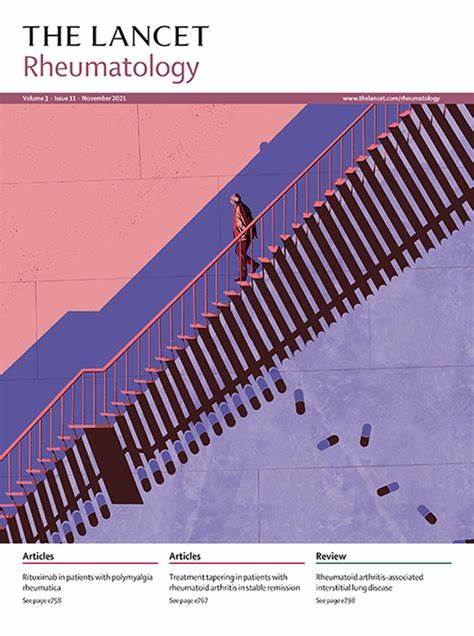类风湿关节炎亚组患者无 DMARD 持续缓解:对两个前瞻性早期关节炎队列的分析。
IF 15
1区 医学
Q1 RHEUMATOLOGY
引用次数: 0
摘要
研究背景:大约20%的类风湿关节炎患者使用改善疾病的抗风湿药物(DMARDs)可以达到持续的无dmard缓解。尽管如此,2022年EULAR建议不鼓励完全停止使用dmard,因为有耀斑风险。这一建议背后的证据来自使用生物dmard的试验人群,仅代表类风湿关节炎患者总人群中的一个亚组。我们假设需要生物DMARD的患者代表一个亚组,与不需要生物DMARD的患者相比,他们达到持续无DMARD缓解的能力较差。方法:在这项研究中,我们使用了来自两个前瞻性随访的早期类风湿关节炎患者群体的数据,莱顿早期关节炎诊所(EAC)和鹿特丹早期关节炎队列(tREACH)的治疗,这是一项治疗-靶点导向试验,当患者对三联dmard治疗(甲氨蝶呤,磺胺嘧啶和羟氯喹)反应不足时开始使用生物dmard。患者伴侣参与了EAC和tREACH的设计。主要结局是持续无dmard缓解,定义为停用dmard至少1年后无临床滑膜炎。使用Kaplan-Meier曲线对5年(EAC)或3年(tREACH)接受或未接受生物dmard的患者进行比较。结果:纳入EAC的627例患者,其中391例(62%)为女性,236例(38%)为男性。平均年龄为60岁(SD 14), 529例患者中502例(95%)为白种人,627例患者中89例(14%)曾使用过生物DMARD, 538例(86%)从未使用过生物DMARD。使用生物DMARD的患者均未达到持续无DMARD缓解,而从未使用生物DMARD的患者中有37%在5年时达到持续无DMARD缓解(风险比[HR] 0.02, 95% CI 0.00 - 0.10;结论:对于需要生物dmard的类风湿关节炎患者亚组,持续无dmard缓解似乎无法实现。相比之下,在不需要生物dmard的类风湿性关节炎患者中,可以实现无dmard缓解。这些数据表明,目前EULAR关于不停止使用DMARD的建议可能存在确定偏差。今后关于停用DMARD的建议应加以修订。资助:荷兰关节炎基金会和欧洲研究委员会。本文章由计算机程序翻译,如有差异,请以英文原文为准。
Sustained DMARD-free remission in subgroups of patients with rheumatoid arthritis: an analysis of two prospective cohorts with early arthritis
Background
About 20% of patients with rheumatoid arthritis on disease-modifying antirheumatic drugs (DMARDs) can reach sustained DMARD-free remission. Nonetheless, the 2022 EULAR recommendations discourage complete cessation of DMARDs due to flare risk. The evidence behind this recommendation is obtained from trial populations using biological DMARDs, representing only a subgroup of the total population of patients with rheumatoid arthritis. We hypothesised that patients requiring biological DMARDs represent a subgroup that is less capable of reaching sustained DMARD-free remission compared with patients not requiring a biological DMARD.
Methods
In this study we used data from two prospectively followed up populations of patients with early rheumatoid arthritis, the Leiden Early Arthritis Clinic (EAC) and the treatment in the Rotterdam Early Arthritis Cohort (tREACH), a treat-to-target steered trial in which biological DMARDs were started when patients had inadequate response to triple DMARD-therapy (methotrexate, sulfasalazine, and hydroxychloroquine). Patient partners were involved in the design of both the EAC and tREACH. The primary outcome was sustained DMARD-free remission, which was defined as absence of clinical synovitis after discontinuation of DMARDs for at least 1 year. Patients who did or did not receive biological DMARDs in 5 years (EAC) or 3 years (tREACH) were compared using Kaplan–Meier curves.
Findings
627 patients from the EAC were included, of whom 391 (62%) were female and 236 (38%) were male. The mean age was 60 years (SD 14) and 502 (95%) of 529 patients were White. 89 (14%) of 627 patients had ever used a biological DMARD and 538 (86%) had never used a biological DMARD. None of the patients that used a biological DMARD reached sustained DMARD-free remission, whereas 37% of the patients who never used a biological DMARD reached sustained DMARD-free remission at 5 years (hazard ratio [HR] 0·02, 95% CI 0·00–0·10; p<0·0001). From the tREACH population, 425 patients were included in the study. 286 (67%) patients were female, 139 (33%) were male, and the mean age was 54 years (SD 14); ethnicity data not recorded. 154 (36%) of 425 patients had ever used a biological DMARD and 271 (64%) had never used a biological DMARD during follow-up. None of the patients that used a biological DMARD reached sustained DMARD-free remission, whereas 15% of patients who never used a biological DMARD reached sustained DMARD-free remission at 3 years (HR 0·03, 95% CI 0·00–0·21; p<0·0001).
Interpretation
For the subgroup of patients with rheumatoid arthritis who require biological DMARDs, sustained DMARD-free remission does not seem attainable. In contrast, in patients with rheumatoid arthritis who do not require biological DMARDs, DMARD-free remission is attainable. These data suggest that the current EULAR recommendation to not stop DMARD use might suffer from ascertainment bias. Future recommendations about DMARD cessation should be amended.
Funding
The Dutch Arthritis Foundation and the European Research Council.
求助全文
通过发布文献求助,成功后即可免费获取论文全文。
去求助
来源期刊

Lancet Rheumatology
RHEUMATOLOGY-
CiteScore
34.70
自引率
3.10%
发文量
279
期刊介绍:
The Lancet Rheumatology, an independent journal, is dedicated to publishing content relevant to rheumatology specialists worldwide. It focuses on studies that advance clinical practice, challenge existing norms, and advocate for changes in health policy. The journal covers clinical research, particularly clinical trials, expert reviews, and thought-provoking commentary on the diagnosis, classification, management, and prevention of rheumatic diseases, including arthritis, musculoskeletal disorders, connective tissue diseases, and immune system disorders. Additionally, it publishes high-quality translational studies supported by robust clinical data, prioritizing those that identify potential new therapeutic targets, advance precision medicine efforts, or directly contribute to future clinical trials.
With its strong clinical orientation, The Lancet Rheumatology serves as an independent voice for the rheumatology community, advocating strongly for the enhancement of patients' lives affected by rheumatic diseases worldwide.
 求助内容:
求助内容: 应助结果提醒方式:
应助结果提醒方式:


